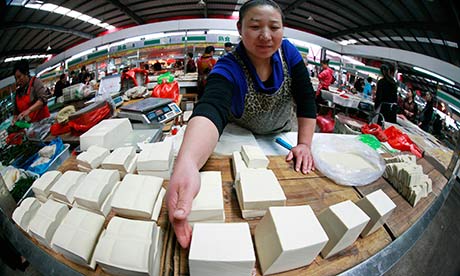Frustrated Chinese send complaints to White House website
Frustrated by censorship and Beijing's stonewalling, bloggers and campaigners are turning to Barack Obama
William Wan for the Washington Post
Guardian Weekly, Tuesday 28 May 2013 14.00 BST

Could sweet-flavoured tofu be on the menu? A vendor arranges tofu at her stall in Huaibei, Anhui province, China. Photograph: Stringer/China/Reuters
The Chinese people would like President Barack Obama to stop an oil refinery from being built in southern China, endorse sweet-flavoured tofu and reopen an 18-year-old criminal probe of a poisoning case. And while he's at it, if he wouldn't mind mobilising US troops to liberate Hong Kong, as well as China as a whole, that would be great, too.
In a strange and diplomatically awkward turn of events, Chinese citizens have flocked to the White House's website in recent weeks to lodge formal petitions, many of them directed against their government. Some are deadly serious, others frivolous and funny. A few have a touch of both.
Some of the signatures – into the hundreds of thousands – were undoubtedly posted in jest, but many more, Chinese online users say, reflect a sincere sense of powerlessness among people frustrated with their leaders' repressive style of governance.
Comments critical of the government are banned on Chinese web forums. And while each provincial capital maintains a petitions office, and thousands of people travel to Beijing each year to report wrongdoing by local officials to the powerful Bureau for Letters and Visits in the capital, such petitioners are often intercepted by thugs hired by those same local officials. They are held at "black sites", at times beaten, then hauled back to their home provinces – a practice that has been documented and is itself the subject of petitions by human rights groups.
So when the link to the White House petition website went viral on Weibo microblogs – the Chinese equivalent of Twitter – all that pent-up frustration found sudden release.
The case that jump-started the fad was an unsolved attack almost two decades ago on a college student named Zhu Ling. In 1995, Zhu was left severely disabled after a suspected thallium poisoning. Another student, who had access to thallium at the university, was a suspect in the case. But she was related to a high-ranking official believed to have close ties with senior Chinese leadership at the time. No charges were ever filed.
Talk of the long-dormant incident resurfaced in April after another student was poisoned in an unrelated case. Comments turned bitter as bloggers recalled the case as an example of a rich, well-connected elite – the target of much resentment these days – getting away with attempted murder.
The government began censoring Zhu's name online, and someone filed a White House petition demanding that the suspect be deported from the US, where many Chinese bloggers believe she lives. Soon after that, residents blocked from online opposition to a chemical plant in the southern city of Kunming adopted the tactic. Someone urged commemoration of those killed during the 1989 Tiananmen Square protests, one of China's most heavily censored topics.
But it didn't take long for the petitions to devolve into the absurd.
By the start of this month, as some petitioners called for a US ban on Beijing fried pancakes, some bloggers tweeted worries that the White House might start filtering their complaints, as China's government has done for so long, despite the website's familiarity with frivolous complaints.
"It's because Chinese people have had to hold their voices for so long," explained one blogger almost apologetically. The man, who spoke on the condition of anonymity because his account was recently shut down by censors, renamed his microblog "Obama, director of China's petition office" recently to show his support. "If only we had more opportunities to express ourselves, we would gradually be more and more mature."
The White House promises a response to any petitions with more than 100,000 signatures, a number the Zhu Ling poisoning case has far surpassed. But how to do that diplomatically may prove tricky. State department officials did not respond to calls for comment.
But at least in China, the online rally on behalf of Zhu has already elicited a response from Beijing.
Authorities recently stopped censoring the name Zhu Ling, and then Beijing officials released an unusual statement defending their investigation of her case. Investigators weren't trying to hide anything 18 years ago, they explained; they simply couldn't find the poisoner despite their best efforts.
Washington Post special correspondent Li Qi contributed to this report
